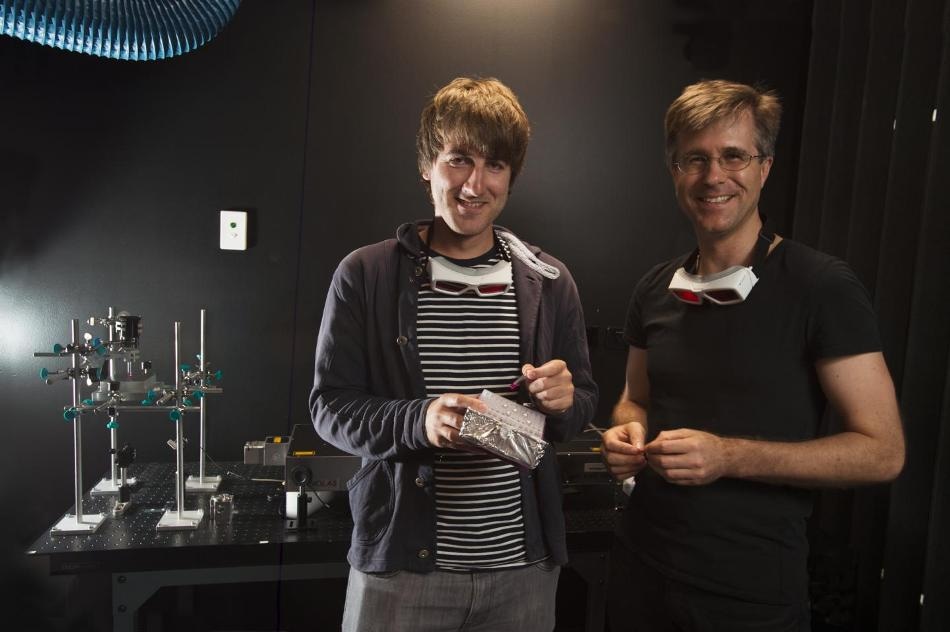Dec 1 2017
It is possible for the manufacture of the integrated circuits and chips, used for daily electronic devices, to be made simpler, cheaper and safer by just being able to switch colored light on and off?
 These are researchers QUT Professor Christopher Barner-Kowollik, right, and Hannes Houck. CREDIT: QUT
These are researchers QUT Professor Christopher Barner-Kowollik, right, and Hannes Houck. CREDIT: QUT
Researchers from Queensland University of Technology (QUT), Karlsruhe Institute of Technology (KIT) and Ghent University have now stepped towards this by developing an innovative system capable of modulating visible, colored light in order to change the reactions of a powerful chemical coupling agent.
Their findings have been featured in Nature Communications.
- Researchers made use of green laser light in order to control the reactivity of triazolinediones (TADs), coupling agents which quickly produce bonds with other chemicals, essential for making materials
- The TADs stopped reacting under green light; the TADs became extremely reactive again when the light was switched off
- The light-switching process could be repeated several times
- The experiment demonstrated that two varied products can be developed from the same set-up by just switching colored light on and off
- Professor Barner-Kowollik, from QUT's Science and Engineering Faculty, and Ghent University's Professor Filip Du Prez co-supervised the collaborative international research project. Key author Hannes Houck is leading PhD studies across the three partner institutions, supported by the Research Foundation-Flanders (FWO).
Professor Barner-Kowollik stated that the potential to use visible light as a remote-controlled on/off chemical reaction switch made room for more possibilities for future industry applications in advanced and chemical manufacturing, including computer chip fabrication.
"At the moment, ultraviolet (UV) light, which has shorter wavelengths than light in the visible spectrum, is used in industry to drive chemical processes," he said.
"Industrial processes making use of less harmful visible light are scarce - a sharp contrast to what occurs in nature.
"For plants, visible light plays a critical role in chemical processes. Trees harvest light during the day and use this as an energy source to grow, releasing oxygen in the process. At night, however, when light is no longer available, the chemical process is altered and plants release carbon dioxide.
"We've been inspired by such natural processes and designed a completely light-switchable chemical reaction system for the first time."
The research team explained that their system could be used for creating light-sensitive materials for 3D laser lithography, permitting printing of extremely tiny structures that could be employed in things such as computer chip fabrication. 3D laser lithography is known to be a particular type of 3D printing containing direct laser light, and used for developing extremely accurate structures in the micro range, such as scaffolds for cells.
QUT is currently exploring 3D laser lithography applications with top KIT physicist Professor Martin Wegener.
"Contemporary chip fabrication is a complex, and expensive, system of chemical processes," Professor Barner-Kowollik said. "Here, due to the so-called light diffraction limit, radiation with short wavelengths - which is very harsh UV light - is used.
"But what if we could use visible light to reversibly switch certain chemical processes and get around the light diffraction limit and print very, very small structures, for example five nanometers wide?
"Being able to switch chemical reactivity within 3D laser lithography could revolutionize chip printing, and make it cheaper, simpler and safer.
"There are substantial barriers to overcome, but potentially the system we have devised with visible light as a chemical deactivation mechanism could provide an avenue to achieve that."